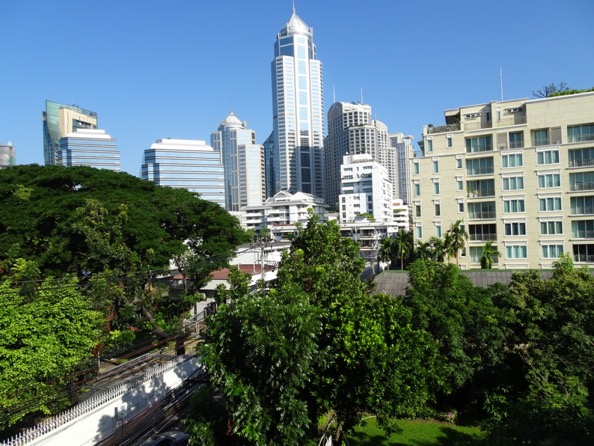Glimpses on challenges of humanitarian workers
05/12/18 01:01

A view from by desk at home in Bangkok
It is a day off today in Thailand, and I am working from home. I am sitting at my desk, occasionally looking out at my window and admiring a nice view that I am lucky to have. As I do this, I am trying to get my head around what I need to do in coming weeks and months. The multitude of issues and challenge is substantial enough to make the task rather difficult.
I am now preparing for conversations with colleagues of diplomatic missions accredited to Thailand, so that we could work out a bit of a strategy on how we advance our support to UNHCR and authorities of the countries in Thailand, Malaysia and Indonesia to provide adequate protection and minimum services to refugees in larger urban centres. Some of you, who know a bit of my work, know that it is a project that I have been following for a long time, and is very important to me both professionally and personally (more information and resources can be find under these links: Refugees in Southeast Asia; Movie about the Refugees in Southeast Asian urban centres: 'Everybody has Hope and Dreams'). The situation of the asylum seekers and refugees in the region is still dire and requires much more attention from the host countries and the international community!
I am also getting ready for evaluating the humanitarian responses to the crises created by the earthquakes and the tsunami in Sulawesi and Lombok of Indonesia. Both of the catastrophes caused a huge humanitarian challenge to millions of people in the area, and to the agencies responsible for providing assistance to the affected populations. Although, the responses are still ongoing, we already have lots of materials providing us some 'food for thought' on what worked, and didn't work during these interventions. We, the humanitarians, need to challenge ourselves constantly on whether we do everything possible to save lives, or help people cope with the overwhelming tragedies. These processes are never comfortable, as one always finds things could have been done better, could have prevented more deaths, could have helped more people. Lots of humanitarian work is about being critical to oneself. Have we spent the resources in right sectors, with right organisations; have we invested enough in preparing to disasters; have we appreciated the complexities of the local context; have we kept a good balance between using local and external resources? If one is serious about doing a right thing, one also needs to accept that these questions will always bother you, and there will always be stuff that you could have arranged and implement in a better way. As I mentioned, it is often uneasy to realise that we have not done 'the best', but it is the nature of the job. We need to go through the processes, to be better prepared next time. Examples of the response in Sulawesi and Lombok should be painful, we, the humanitarians, could have and should have performed better.
Then, continuing the thought of response to disasters, the responses to actual crises depend on how well you are prepared in advance. The preparedness involves so many things... One looks at what is already in place (finances, logistics, equipment, availability of specialists, infrastructure (hospitals, roads, water networks, airports, etc.,), existing laws, and thousands of other things) and try identify the gaps keeping in mind what kind of calamities we may be facing. Of course, one also needs to remember issues such as culture, religion, international relations of the region/country in question just to name a few things. Finally, we look at out own organisations trying to realise what we can offer, what we are good at, what our weaknesses are... Once one have some understanding of all these complexities, we try to make decisions on what we all need to do to improve, to make better, so that we end up in contingencies that have a chance to work, when the disaster strikes. Again, it is never easy, one can never think of everything... We will still try doing a bit of it next week though! We are about to kick-start our work on our own organisational preparedness to disasters in the Pacific Region, the part of the world that is extremely vulnerable to typhoons, earthquakes, tsunamis, volcano eruptions or droughts. Most of these threats are enhanced by the ongoing climatic changes. Winds, drought are indeed more severe and more frequent in this part of the world, thus making our work to be more challenging and less predictable.
And finally, I shouldn't forget to get ready for the trip to the Philippines, where I am going to be helping my colleagues from our Manila office to plan our work for next year. Working in the Philippines involves lots of preparedness to natural disasters (volcanos, earthquakes, typhoons, tsunamis, floods, etc.,) and to provision of services to victims of the conflict that has been active in the southern part of the country (Mindanao). It gets even more complicated when a natural disaster strikes in an area which is also home to flighting and conflict related displacement. Clearly, we will have lots of work ahead in preparing ourselves to what may be coming in 2019.
As all the work goes on, I will be informing you how things develop. Until that happens, wishing you a peaceful end of the week!
